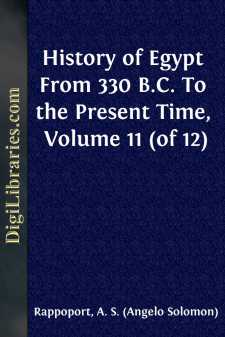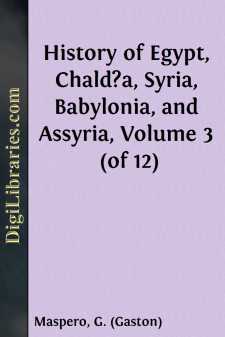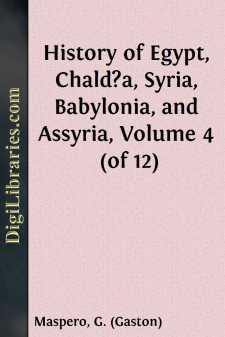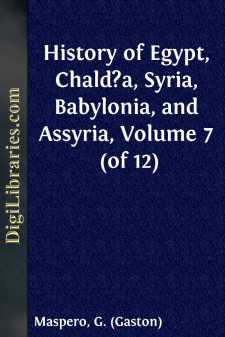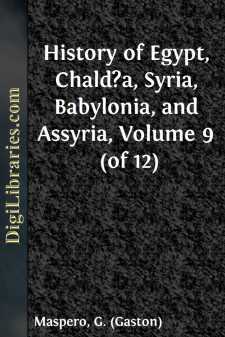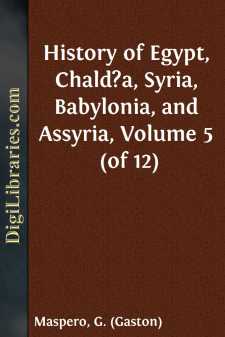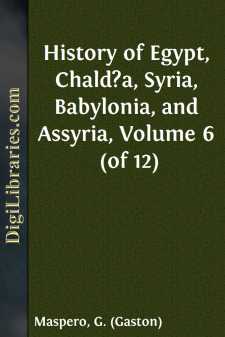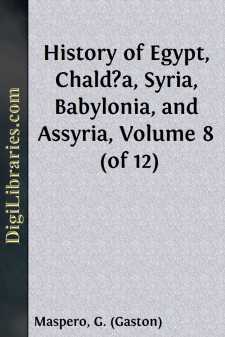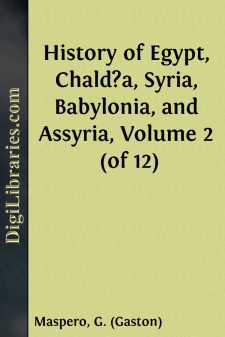History
- Africa 30
- Americas (North Central South West Indies) 50
- Ancient
- Asia 58
- Australia & New Zealand 8
- Canada 41
- Caribbean & West Indies 1
- Civilization 20
- Eastern Europe 12
- Europe 310
- Expeditions & Discoveries 60
- General 77
- Historical Geography 1
- Jewish 9
- Latin America 3
- Medieval 8
- Middle East 13
- Military 248
- Revolutionary 8
- Study & Teaching 5
- United States 353
- Western Europe 56
- World 13
Ancient Books
Sort by:
CHAPTER I—EGYPT UNDER THE ROMAN EMPIRE The Roman dominion on the Nile: Settlement of the Egyptian frontiers: Religious developments: Rebellions. Augustus began his reign in Egypt in B.C. 30 by ordering all the statues of Antony, of which there were more than fifty ornamenting the various public buildings of the city, to be broken to pieces; and it is said he had the meanness to receive a bribe of one...
more...
CHAPTER I—ANCIENT CHALDÆA The Creation, the Deluge, the history of the gods—The country, its cities its inhabitants, its early dynasties. "In the time when nothing which was called heaven existed above, and when nothing below had as yet received the name of earth,* Apsu, the Ocean, who first was their father, and Chaos-Tiâmat, who gave birth to them all, mingled their waters in one, reeds...
more...
CHAPTER I THE FIRST CHALDÆAN EMPIRE AND THE HYKSÔS IN EGYPT Syria: the part played by it in the ancient world—Babylon and the first Chaldæan empire—The dominion of the Hyksôs: Âhmosis. Some countries seem destined from their origin to become the battle-fields of the contending nations which environ them. Into such regions, and to their cost, neighbouring peoples come from century to century to...
more...
CHAPTER I—THE ASSYRIAN REVIVAL AND THE STRUGGLE FOR SYRIA Assur-nazir-pal (885-860) and Shalmaneser III. (860-825)—The kingdom of Urartu and its conquering princes: Menuas and Argistis. Assyria was the first to reappear on the scene of action. Less hampered by an ancient past than Egypt and Chaldæa, she was the sooner able to recover her strength after any disastrous crisis, and to assume again...
more...
CHAPTER I—THE IRANIAN CONQUEST The Iranian religions—Cyrus in Lydia and at Babylon: Cambyses in Egypt —Darius and the organisation of the empire. The Median empire is the least known of all those which held sway for a time over the destinies of a portion of Western Asia. The reason of this is not to be ascribed to the shortness of its duration: the Chaldæan empire of Nebuchadrezzar lasted for a...
more...
CHAPTER I—THE EIGHTEENTH THEBAN DYNASTY—(continued) Thutmosis III.: the organisation of the Syrian provinces—Amenothes III.: the royal worshippers of Atonû. In the year XXXIV. the Egyptians reappeared in Zahi. The people of Anaugasa having revolted, two of their towns were taken, a third surrendered, while the chiefs of the Lotanû hastened to meet their lord with their usual tribute. Advantage...
more...
CHAPTER I—THE CLOSE OF THE THEBAN EMPIRE—(continued) Ramses III.: Manners and Customs—Population—The predominance of Amon and his high priests. Opposite the Thebes of the living, Khafîtnîbûs, the Thebes of the dead, had gone on increasing in a remarkably rapid manner. It continued to extend in the south-western direction from the heroic period of the XVIIIth dynasty onwards, and all the...
more...
EDITOR'S PREFACE Professor Maspero does not need to be introduced to us. His name is well known in England and America as that of one of the chief masters of Egyptian science as well as of ancient Oriental history and archaeology. Alike as a philologist, a historian, and an archaeologist, he occupies a foremost place in the annals of modern knowledge and research. He possesses that quick...
more...
CHAPTER I—SENNACHERIB (705-681 B.C.) The struggle of Sennacherib with Judæa and Egypt—Destruction of Babylon. Sennacherib either failed to inherit his father's good fortune, or lacked his ability.* He was not deficient in military genius, nor in the energy necessary to withstand the various enemies who rose against him at widely removed points of his frontier, but he had neither the...
more...
CHAPTER I—THE POLITICAL CONSTITUTION OF EGYPT The king, the queen, and the royal princes—Administration under the Pharaohs—Feudalism and the Egyptian priesthood, the military—The citizens and country people. Between the Fayûm and the apex of the Delta, the Lybian range expands and forms a vast and slightly undulating table-land, which runs parallel to the Nile for nearly thirty leagues. The...
more...


